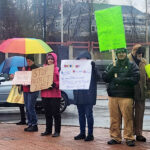Staff Writer
EASTON — The Easton selectmen were unanimous in their decision to oppose two referendum questions, and voted to support another on items posed to voters on the November ballot. “Under normal circumstances, selectmen in Easton stay away from taking a position on ballot questions, instead leaving it up to everyone to form their own opinions. That’s not the case this year. Three questions pertain to financial issues and educational issues that will negatively affect the Easton taxpayer in the future, if passed, and they want their citizenry to know how they collectively fell about it,” said Town Manager John Hangen.
Skipping comment on Question 1 — allowing same-gender couples to marry — the selectmen collectively agreed a vote of ‘no’ to Question 2, which would revise municipal excise taxes.
“While at first glance this is appealing to voters to save on excise tax on new vehicles and hybrids, it will shift approximately $78,000 to the existing property owners instead of reducing taxes,” explained Hangen.
According to Hangen, passage of Question 2 would result in the town’s mil rate increasing by a half mil.
“The selectmen do not want to shift this burden to Easton taxpayers. They believe the loss of the excise tax would negatively impact property tax payers for the benefit of a few who would benefit from the excise tax change,” said Hangen.
The selectmen favored Question three, with regard to school consolidation efforts, agreeing it was in the community’s best interest to repeal the school consolidation law.
“The Easton School Committee, the selectmen and a special review committee, which included residents of Easton, studied this question. Their collective opinion after the study was that Easton would spend more of the taxpayers’ money to consolidate, as proposed by the state in 2007, and that Easton would lose independence and the ability to make local decisions for its students,” said Hangen.
Question 4, better known as TABOR II, received the selectman’s disapproval.
“Easton is still blessed with the town meeting form of government where we all get together once a year, discuss what direction we want to see the town move in and decide our budget and fate collectively, moving forward from there,” said Hangen. “With the approval of this question, we tie our hands in bureaucracy and have referendum questions on matters that exceed 4 percent of a certain base.”
Hangen said this would create a red-tape nightmare and increase costs, rather than reducing them.
“Mailings would have to be made to every taxpayer and certain informalities would be lost, which now make us efficient — and not bureaucratic. Passing this question would, in effect, create government by referendum,” said Hangen.
Passage of Question 2 and 4 would result in increased taxes for taxpayers and wouldn’t benefit residents of Easton, according to Hangen.
“The Easton selectmen feel strongly that passage of Questions 2 and 4, separately or collectively, would lead to increased real estate property taxes,” said Hangen.







